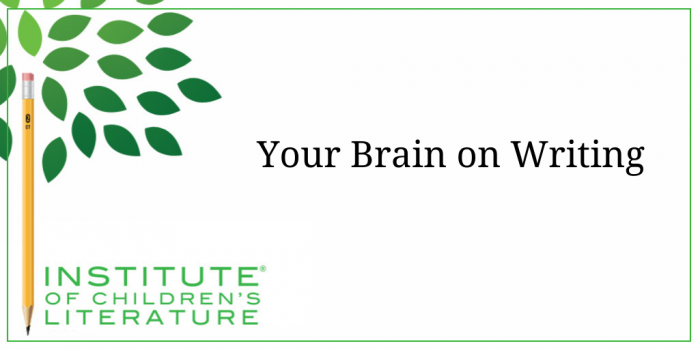1000 N. West Street #1200, Wilmington, DE 19801
© 2024 Direct Learning Systems, Inc. All rights reserved.

We teach our students how to write and get published!
View our Course Catalog >
For me, being a writer is more than something I do.
It’s something I am.
A writer is always a writer, whether sitting before a computer or picking up a pen and a notebook, or merely walking through the grocery store. A writer is always processing life as a writer. It never stops. And that act of looking, planning, and writing changes you. In fact, research by neuroscientists suggests that writing has an effect on your brain that changes you. More than that, it changes your audience.
Being a professional writer affects the way your brain functions. A study by German researchers led by Martin Lotze, observed the brain activity of people writing stories. According to the study, a network of brain regions work together to create fiction, but this activity changes between novice writers and those who have spent a long time writing. Lotze says the brain activity of professional writers was similar in some way to the brains of other people skilled in complex action like musicians or athletes. So I may have writer butt, but I have star athlete brains!
The unique brain activity began before the “writer” actually began writing. The visual centers of the brain lit up as people planned stories. The planners were seeing the stories in their heads. Those of us who write know how that feels, but now science backs it up. But the study showed another interesting thing. The most experienced writers also showed activity in speech centers as they planned. They not only “saw” their stories, they “narrated” them in their heads with words. The more you write, the more this “narration” becomes simply part of what you do. After writing on a daily basis for many years, I can honestly say I narrate my life in my head all the time.
Additionally, research has found other areas of the brain can be stimulated depending upon the contents of the story you’re telling. If you are planning and writing a story with clearly imagined action, the motor cortex of your brain lights up. If the story includes sensory detail, your brain will register a sensory response. And if you’ve done the job well, this response is then passed on to the reader. In a well-written story, the reader will also experience activity in sensory and motor areas of the brain, because this thing that you’ve created using nothing but words is actually bringing the readers into the moment and making them live it through imagination. But your description of action and sensory detail must be evocative for this to happen. Research shows that common figures of speech will not produce the effect. That means if you want the reader to feel the smoothness of a surface in your story, don’t choose the first analogy that comes to mind (as that will often be the cliché). Instead offer something unusual and trigger that brain response that makes the story more brain stimulating for the reader.
Some researchers have even argued that fiction helps us survive and thrive even into old age. According to cognitive scientist Steven Pinker, fiction can help us prepare for problems we might face and allows us to develop strategies for dealing with those problems, thus giving us survival techniques. And neuroscience research is beginning to suggest that intellectual activity is important for keeping a healthy brain as we age. One of the most frequent issues of the aging brain is difficulty in retrieving words and names, but time spent writing is all about words and retrieving them using multiple parts of the brain.
Researchers have also suggested that writing by hand offers some benefits over doing all your writing with the computer, especially for those looking to keep a sharp mind as we age. The combination of motor-skills, memory, and slower pace that handwriting brings to the experience can also help break writer’s block, simply by pulling yourself away from the unblinking eye of the computer.
So writing a lot is the kind of stimulating brain activity that may help you stay sharp in the years ahead, and the more you do it, the more parts of your brain are activated. And you’re not only doing a favor for your own brain, you’re doing it for the brains of your readers.
You’re like a brain trainer!
With over 100 books in publication, Jan Fields writes both chapter books for children and mystery novels for adults. She’s also known for a variety of experiences teaching writing, from one session SCBWI events to lengthier Highlights Foundation workshops to these blog posts for the Institute of Children’s Literature. As a former ICL instructor, Jan enjoys equipping writers for success in whatever way she can.
1000 N. West Street #1200, Wilmington, DE 19801
© 2024 Direct Learning Systems, Inc. All rights reserved.
1000 N. West Street #1200, Wilmington, DE 19801
© 2024 Direct Learning Systems, Inc. All rights reserved.
1000 N. West Street #1200, Wilmington, DE 19801
© 2024 Direct Learning Systems, Inc. All rights reserved.
1000 N. West Street #1200, Wilmington, DE 19801
© 2025 Direct Learning Systems, Inc. All rights reserved.
1000 N. West Street #1200, Wilmington, DE 19801
©2025 Direct Learning Systems, Inc. All rights reserved. Privacy Policy.